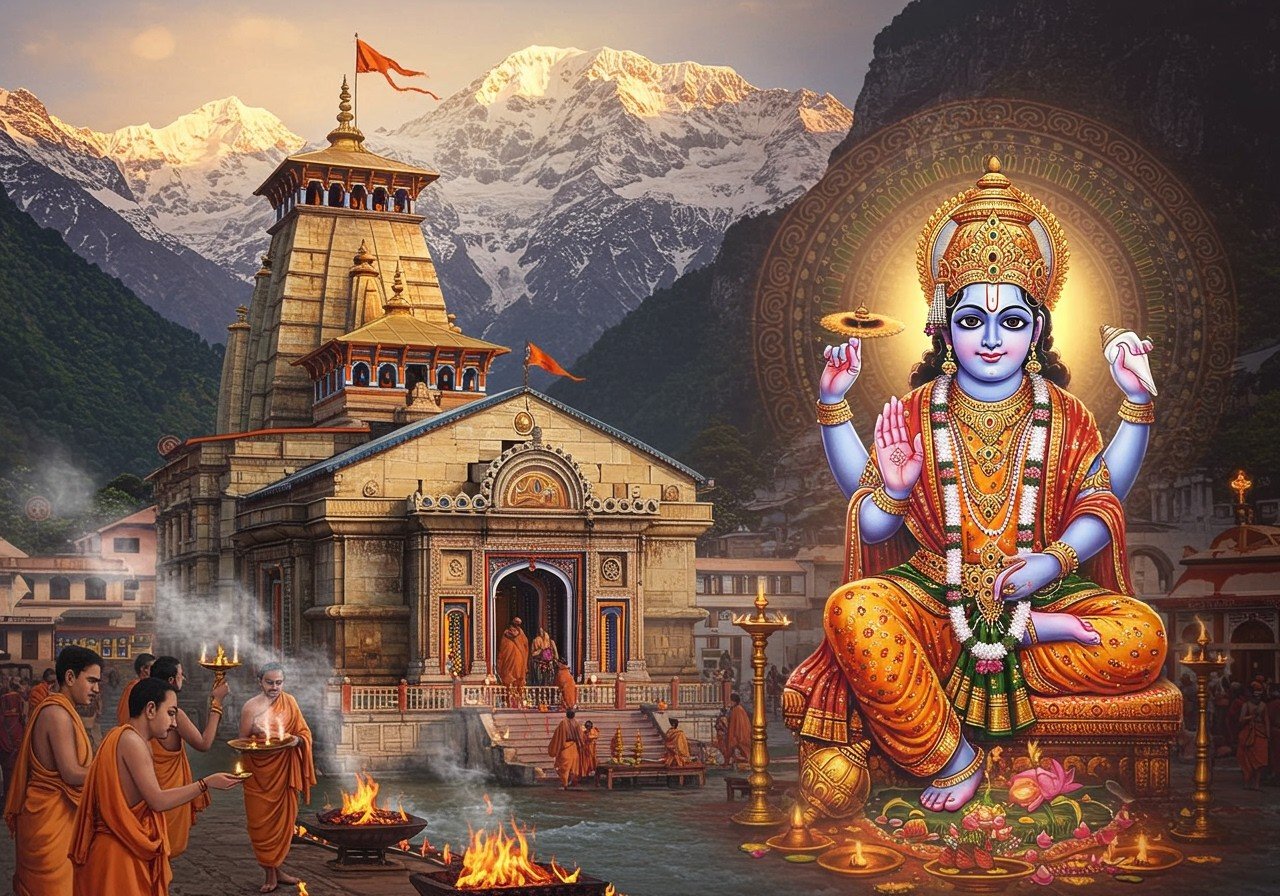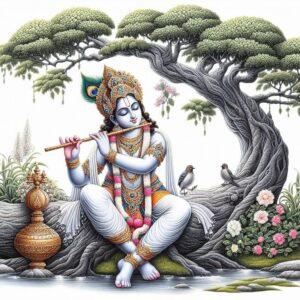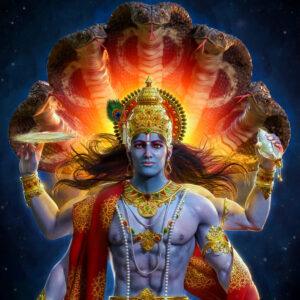
Nestled high in the Garhwal Himalayas, the Badrinath Temple stands as a beacon of faith, dedicated to Lord Vishnu. This sacred site is revered as one of the four Char Dhams, drawing countless devotees seeking spiritual solace and blessings. Its rich history, intricate rituals, and the divine presence of Lord Badrinarayan make it a cornerstone of Hindu pilgrimage.
History and Significance of Badrinath Temple
The Badrinath Temple’s history stretches back to the Vedic era, shrouded in ancient legends and mythology. Established by Adi Shankaracharya in the 8th century, the temple showcases traditional North Indian Garhwali architecture. Situated near the banks of the holy Alaknanda River at an elevation of 3,133 meters, Badrinath Temple remains open for pilgrims from April to November. The harsh winter conditions necessitate its closure during the remaining months. The temple is also one of the 108 Divya Desams and part of the Panch Badri temples.
Deities Worshipped at Badrinath Temple
Lord Badrinarayan, a form of Lord Vishnu depicted in a meditative posture, is the primary deity at Badrinath Temple. The revered black stone idol of Vishnu, believed to have been discovered by Adi Shankaracharya, holds immense significance for devotees. Other deities gracing the temple include Garuda, Narada, Uddhava, Kubera, Nar, and Narayan, each with their own unique stories woven into the fabric of Hindu mythology. Goddess Lakshmi also holds a place of reverence within the temple complex. The majestic Nara-Narayana mountain ranges form a breathtaking backdrop, adding to the spiritual aura of the temple.
Rituals Performed at Badrinath Temple
A series of daily rituals and pujas are meticulously performed at Badrinath Temple, beginning with the morning and evening aartis. Key rituals such as Abhishek (ritual bathing of the deity), Alankara (adorning the deity), and Bhog (offering of food) are integral parts of the daily worship. The temple priests diligently follow the Nitya Niyam, the prescribed daily routine. Special pujas are conducted during significant festivals like Janmashtami, Diwali, and Badri Kedar Utsav, adding to the vibrant spiritual atmosphere. The Ashtami Puja and Ekadashi rituals hold particular significance. The Rawal, the chief priest traditionally from Kerala, plays a central role in these sacred ceremonies.
Offerings Made at Badrinath Temple
Devotees express their devotion through a variety of offerings at Badrinath Temple. Flowers, fruits, and sweets are common offerings, symbolizing love and reverence. Tulsi leaves, considered sacred to Lord Vishnu, are particularly significant offerings. Dry fruits, honey, and ghee form part of the Bhog, signifying purity and nourishment. During the winter closing ceremony, devotees offer clothing and blankets for the deity, a symbolic gesture of care. Akshata, rice mixed with turmeric, represents prosperity and purity, while Tirtha Prasad, holy water from the Alaknanda River, carries divine blessings. Some devotees also offer gold and silver ornaments as a mark of gratitude and devotion.
Aarti Timings and Schedule
The aarti schedule at Badrinath Temple is a vital aspect of the pilgrimage experience. The Mangala Aarti, the morning aarti, commences at 4:30 AM, invoking a serene start to the day. The Sandhya Aarti, held around 7:00 PM, concludes the day’s activities with prayers and chants. Throughout the day, rituals like Abhishek and Alankara take place at specific times. Festivals and special occasions may have varied aarti schedules, offering unique opportunities for spiritual enrichment. The temple priests play a crucial role in conducting these aartis with utmost devotion and precision.
How Poojn.in Helps with Badrinath Temple Offerings and Rituals
Poojn.in, India’s leading provider of spiritual and puja items, offers a wide selection of authentic products to enhance your devotional experience at Badrinath Temple. As Lord Vishnu is the presiding deity, we offer:
- Complete puja samagri kits for Vishnu worship: These comprehensive kits contain all the essential items required for performing Vishnu pujas, ensuring convenience and authenticity. They include items like diyas, incense sticks, kumkum, and more.
- Pure copper and brass items for temple offerings: We offer a range of beautifully crafted copper and brass items, such as kalash, thalis, and diyas, ideal for making offerings at the temple. These durable and auspicious items add to the sanctity of your worship.
- Traditional dhoop and deep items: Enhance the spiritual atmosphere with our selection of traditional dhoop and deep items. Choose from a variety of incense sticks, dhoop cones, and oil lamps to create a sacred ambiance.
- Sacred tulsi mala and rudraksha: Wear or offer these sacred beads to Lord Vishnu as a symbol of devotion. Our collection includes genuine tulsi and rudraksha beads, known for their spiritual significance.
- Pure ghee for abhishek ceremonies: Perform abhishek rituals with our pure and high-quality ghee. Ghee is considered a sacred offering and is believed to bestow blessings and purity.
- Authentic panchamrit ingredients: Prepare panchamrit, the sacred five-nectar offering, with our authentic ingredients. We provide high-quality milk, yogurt, honey, ghee, and sugar to ensure the purity of your offering.
- Cotton wicks (batti) for aarti: Light your aarti lamps with our pure cotton wicks. These wicks are specifically designed for puja rituals and ensure a clean and steady flame.
- Pure sandalwood (chandan) powder: Offer sandalwood paste to Lord Vishnu, a traditional symbol of reverence and purity. Our sandalwood powder is finely ground and sourced from high-quality sandalwood.
- Fresh tulsi leaves for offerings: Offer fresh tulsi leaves, considered highly sacred to Lord Vishnu. We provide fresh and carefully packaged tulsi leaves for your puja rituals.
Visit www.poojn.in to explore our complete collection of authentic puja items and enhance your spiritual journey.
Conclusion
A pilgrimage to Badrinath Temple is a deeply transformative spiritual experience. The temple’s rich history, divine deities, and sacred rituals offer a profound connection to Hindu faith. Each offering, whether humble or grand, carries the devotee’s love and devotion. Understanding the aarti timings and participating in the rituals enhances the spiritual journey, allowing devotees to immerse themselves in the divine presence. Embrace the serenity and spiritual energy of Badrinath Temple, and let it enrich your soul. Learn more about other temples dedicated to Lord Vishnu, such as the Chennakesava Swamy Temples, Sri Prasanna Chennakesava Swamy Temple, and Chennakesava Swamy Temple through our informative guides.
FAQs on Badrinath Temple
Who is the main deity of Badrinath Temple? The primary deity is Lord Vishnu, worshipped in the form of Lord Badrinarayan.
What are the common offerings? Devotees offer flowers, fruits, sweets, dry fruits, tulsi leaves, and more. You can find a wide selection of these items at poojn.in.
What are the aarti timings? The morning aarti is typically at 4:30 AM, while the evening aarti is around 7:00 PM. These timings can vary, so it’s advisable to check with the temple authorities.
Are there any special rituals? Yes, special rituals like Maha Abhishek, Geet Govind recitations, and Bhagavad Gita readings are performed. You can find items needed for puja, such as bel malas, at poojn.in.
What is the significance of Badrinath Temple? It is one of the four sacred Char Dham pilgrimage sites and holds immense spiritual importance for Hindus. You might also be interested in Swarnagiri Venkateswara Temple and other related temples.
Can I perform a personal puja? Yes, personal pujas can be arranged through the temple office. Poojn.in offers various items for personal pujas.
What should I bring for puja? It’s recommended to bring flowers, fruits, incense, and sweets. Poojn.in provides a wide range of puja items.
Is there a dress code? Modest and traditional attire is advised for visiting the temple.


